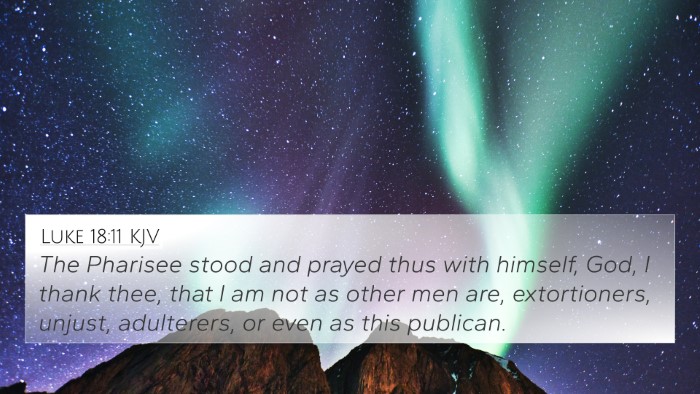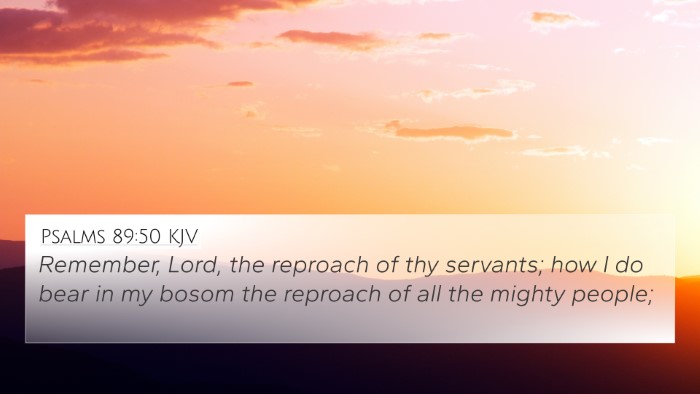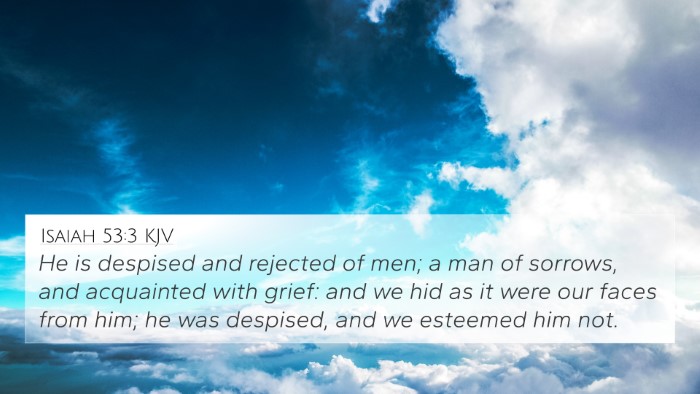Psalms 123:3 - Understanding the Meaning
Psalms 123:3 is a poignant verse that conveys a message of profound dependence on God amid trials and a yearning for divine mercy. This verse sets the tone for the psalmist’s petitionary prayer and reflects the deep longing for God's grace.
Verse in Context
The psalm reads: "Have mercy upon us, O Lord, have mercy upon us: for we are exceedingly filled with contempt." Here, the repetition of the plea for mercy emphasizes the intensity of the psalmist's need and the severity of the situation.
Summarized Insights from Commentaries
- Matthew Henry: Henry indicates that this verse reflects not only a request for mercy but also identifies the source of affliction—contempt from those around. The psalmist is aware of the ridicule and disdain from adversaries, hence the urgent appeal for divine intervention.
- Albert Barnes: Barnes emphasizes the psalmist’s recognition of human weakness. The cry for mercy underscores a humble acknowledgment of their inability to withstand challenges without God’s help. It suggests that the believers should continually turn to God in their lowly state.
- Adam Clarke: Clarke notes the contrast between the psalmist's lowly condition and God's high majesty. The desperate plea illustrates the believer's position relative to God's mercy, suggesting that even when afflicted, lifting one’s eyes towards heaven is a pathway to grace.
Thematic Connections
This verse echoes various themes found throughout the Scriptures, especially regarding mercy, divine assistance, and the human condition in relation to God’s sovereignty. Here are some thematic connections and cross-references:
- Psalm 86:3: "Be merciful to me, O Lord, for I cry to You all day long." This verse parallels the plea in Psalms 123:3 by expressing the continued dependence on God's mercy.
- James 4:6: "But He gives more grace. Therefore He says: 'God resists the proud, but gives grace to the humble.'" This verse emphasizes the necessity of humility in seeking God's mercy, much like the psalmist’s posture.
- 2 Corinthians 12:9: "But He said to me, 'My grace is sufficient for you, for My strength is made perfect in weakness.'" This highlights that in our vulnerability, God's grace prevails, resonating with the sentiments of Psalms 123:3.
- Psalm 123:1: "Unto You I lift up my eyes, O You who dwell in the heavens." This verse establishes the attitude of looking towards God in times of trouble, harmonizing with the cry for mercy in verse 3.
- Lamentations 3:22-23: "Through the Lord's mercies, we are not consumed, because His compassions fail not. They are new every morning; great is Your faithfulness." This passage connects the theme of divine mercy with daily renewal, similar to the psalmist's plea for mercy.
- Hebrews 4:16: "Let us therefore come boldly to the throne of grace, that we may obtain mercy and find grace to help in time of need." Here, the call to access God's mercy directly correlates with the urgency of the psalmist’s request.
- Isaiah 30:18: "Therefore the Lord will wait, that He may be gracious to you." This verse reflects God’s disposition towards showing mercy, which aligns with the underlying theme of Psalms 123:3.
Cross-Referencing Biblical Texts
Psalms 123:3 functions as a pivotal verse that encourages believers to engage in cross-referencing Biblical texts to understand the depth of their plea for mercy. By linking verses, one can discover a network of support and affirmation of faith throughout Scripture.
Why Cross-Referencing is Important
Understanding the connections between Bible verses not only enhances interpretation but also enriches personal faith. Cross-referencing opens a dialogue within Scripture, allowing for deeper insights into God’s character and His dealings with humanity.
Tools for Bible Cross-Referencing
To study Psalms 123:3 and its connections effectively, utilizing various tools for Bible cross-referencing is paramount. Here are some recommended approaches:
- Bible Concordance: A comprehensive index helps locate verses related by theme or keyword.
- Bible Cross-Reference Guide: These resources often provide thematic connections throughout the Bible.
- Physical and Digital Study Bibles: Many study Bibles include notes and linked references, aiding in comparative analysis.
- Online Bible Tools: Websites and apps that offer search functions for cross-references make it easier to find related verses.
- Commentaries: Utilizing commentaries, such as those by Matthew Henry, Albert Barnes, and Adam Clarke, reveals insights and interpretations that enrich understanding.
Conclusion
Psalms 123:3 encapsulates the essence of seeking divine mercy amidst struggles. By engaging in comparative Bible verse analysis, believers uncover the depth of their spiritual needs and God’s unwavering faithfulness. The inter-Biblical dialogue this verse inspires not only confirms the relational nature of scripture but also encourages a vibrant faith rooted in God’s mercy.
Final Thoughts on Cross-Referencing
The Bible cross-reference system significantly enhances personal study, allowing individuals to delve deeper into themes of grace and mercy across the biblical narrative. Understanding the relationships between these sacred texts solidifies faith and provides comfort in times of distress.













